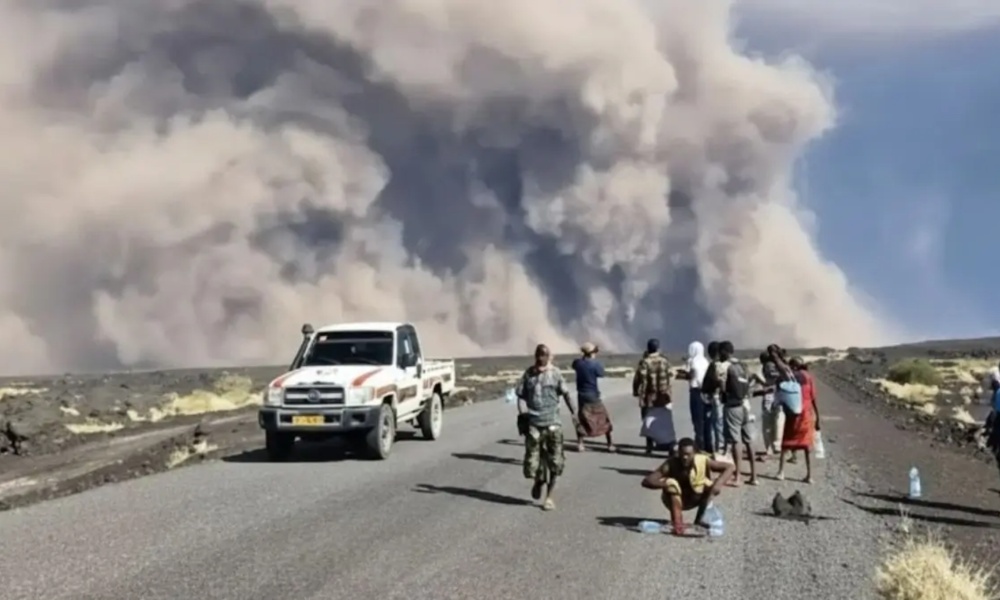Science & Technology
Scientists document how space travel messes with the human brain

Space can be an unfriendly place for the human body, with microgravity conditions and other factors tampering with our physiology, from head to toe – head, of course, being a primary concern.
A new NASA-funded study provides a deeper understanding of the issue. Researchers said on Thursday that astronauts who traveled on the International Space Station (ISS) or NASA space shuttles on missions lasting at least six months experienced significant expansion of the cerebral ventricles – spaces in the middle of the brain containing cerebrospinal fluid, Reuters reported.
This colorless and watery fluid flows in and around the brain and spinal cord. It cushions the brain to help protect against sudden impact and removes waste products.
Based on brain scans of 30 astronauts, the researchers found that it took three years for the ventricles to fully recover after such journeys, suggesting that an interval of at least that duration would be advisable between longer space missions.
“If the ventricles don’t have sufficient time to recover between back-to-back missions, this may impact the brain’s ability to cope with fluid shifts in microgravity. For example, if the ventricles are already enlarged from a previous mission, they may be less compliant and/or have less space to expand and accommodate fluid shifts during the next mission,” said University of Florida neuroscientist Heather McGregor, lead author of the study published in the journal Scientific Reports.
Age-related ventricular enlargement – caused not by microgravity but by brain atrophy – can be associated with cognitive decline.
“The impact of ventricular expansion in space travelers is not currently known. More long-term health follow-up is needed. This ventricular expansion likely compresses the surrounding brain tissue,” University of Florida applied physiology and kinesiology professor and study senior author Rachael Seidler said.
The absence of Earth’s gravity modifies the brain.
“This seems to be a mechanical effect,” Seidler said. “On Earth, our vascular systems have valves that prevent all of our fluids from pooling at our feet due to gravity. In microgravity, the opposite occurs – fluids shift toward the head. This headward fluid shift likely results in ventricular expansion, and the brain sits higher within the skull.”
The study involved 23 male and seven female astronauts – average age around 47 – from the U.S., Canadian and European space agencies. Eight traveled on space shuttle missions of about two weeks. Eighteen were on ISS missions of about six months and four on ISS missions of about a year.
Little to no ventricular volume change occurred in astronauts after short missions. Enlargement occurred in astronauts after missions of six months or longer, though there was no difference in those who flew for six months compared to those who did so for a year.
“This suggests that the majority of ventricle enlargement happens during the first six months in space, then begins to taper off around the one-year mark,” McGregor said.
The fact that enlargement did not worsen after six months could be good news for future Mars missions on which astronauts may spend two years in microgravity during the journey.
“This preliminary finding is promising for astronaut brain health during long-duration missions, but it’s still important that we examine MRI data from a larger group of astronauts and following even longer missions,” McGregor said.
The absence of enlargement following short flights was good news for people who may consider short space tourism jaunts, Seidler added, as that industry develops.
Microgravity conditions also cause other physiological effects due to the reduced physical load on the human body. These include bone and muscle atrophy, cardiovascular changes, issues with the balance system in the inner ear and a syndrome involving the eyes. Elevated cancer risk from the greater exposure to solar radiation that astronauts may encounter the further they travel from Earth is another concern.
Science & Technology
Australia social media ban set to take effect, sparking a global crackdown
For the social media businesses, the implementation marks a new era of structural stagnation as user numbers flatline and time spent on platforms shrinks, studies show.

Australia is set to become the first country to implement a minimum age for social media use on Wednesday, with platforms like Instagram, TikTok and YouTube forced to block more than a million accounts, marking the beginning of an expected global wave of regulation.
From midnight, 10 of the biggest platforms will be required to block Australians aged under 16 or be fined up to A$49.5 million ($33 million), Reuters reported.
The law received harsh criticism from major technology companies and free speech advocates, but was praised by parents and child advocates.
The rollout closes out a year of speculation about whether a country can block children from using technology that is built into modern life. And it begins a live experiment that will be studied globally by lawmakers who want to intervene directly because they are frustrated by what they say is a tech industry that has been too slow to implement effective harm-minimisation efforts.
Governments from Denmark to Malaysia – and even some states in the U.S., where platforms are rolling back trust and safety features – say they plan similar steps, four years after a leak of internal Meta (META.O) documents showed the company knew its products contributed to body image problems and suicidal thoughts among teenagers while publicly denying the link existed.
“While Australia is the first to adopt such restrictions, it is unlikely to be the last,” said Tama Leaver, a professor of internet studies at Curtin University.
“Governments around the world are watching how the power of Big Tech was successfully taken on. The social media ban in Australia … is very much the canary in the coal mine.”
A spokesperson for the British government, which in July began forcing websites hosting pornographic content to block under-18 users, said it was “closely monitoring Australia’s approach to age restrictions.”
“When it comes to children’s safety, nothing is off the table,” they added.
Few will scrutinise the impact as closely as the Australians. The eSafety Commissioner, an Australian regulator tasked with enforcing the ban, hired Stanford University and 11 academics to analyse data on thousands of young Australians covered by the ban for at least two years.
Though the ban covers 10 platforms initially, including Alphabet’s (GOOGL.O), YouTube, Meta’s Instagram and TikTok, the government has said the list will change as new products appear and young users switch to alternatives.
Of the initial 10, all but Elon Musk’s X have said they will comply using age inference – guessing a person’s age from their online activity – or age estimation, which is usually based on a selfie. They might also check with uploaded identification documents or linked bank account details.
Musk has said the ban “seems like a backdoor way to control access to the internet by all Australians” and most platforms have complained that it violates people’s right to free speech.
For the social media businesses, the implementation marks a new era of structural stagnation as user numbers flatline and time spent on platforms shrinks, studies show.
Platforms say they don’t make much money showing advertisements to under-16s, but they add that the ban interrupts a pipeline of future users. Just before the ban took effect, 86% of Australians aged 8 to 15 used social media, the government said.
“The days of social media being seen as a platform for unbridled self-expression, I think, are coming to an end,” said Terry Flew, the co-director of University of Sydney’s Centre for AI, Trust and Governance.
Platforms responded to negative headlines and regulatory threats with measures like a minimum age of 13 and extra privacy features for teenagers, but “if that had been the structure of social media in the boom period, I don’t think we’d be having this debate,” he added.
Science & Technology
Ethiopian volcano erupts for first time in nearly 12,000 years
Ash from the eruption drifted across the region, spreading over Yemen, Oman, India, and parts of Pakistan.

The Hayli Gubbi volcano in Ethiopia’s Afar region has erupted for the first time in almost 12,000 years, sending massive ash plumes soaring up to 14 kilometres into the atmosphere, according to the Toulouse Volcanic Ash Advisory Centre.
The eruption began on Sunday and lasted several hours. Hayli Gubbi, located around 800 kilometres northeast of Addis Ababa near the Eritrean border, sits within the geologically active Rift Valley, where two major tectonic plates meet. The volcano rises roughly 500 metres above the surrounding landscape.
Ash from the eruption drifted across the region, spreading over Yemen, Oman, India, and parts of Pakistan. Satellite imagery and social-media videos captured a towering column of white smoke billowing into the sky.
The Smithsonian Institution’s Global Volcanism Program notes that Hayli Gubbi has no recorded eruptions during the Holocene, the period dating back about 12,000 years to the end of the last Ice Age.
Volcanologist Simon Carn of Michigan Technological University also confirmed on Bluesky that the volcano had “no record of Holocene eruptions.”
Science & Technology
Cloudflare outage easing after millions of internet users affected

A global outage at web-infrastructure firm Cloudflare began to ease on Tuesday afternoon after preventing people from accessing major internet platforms, including X and ChatGPT.
Cloudflare, whose network handles around a fifth of web traffic, said it started to investigate the internal service degradation around 6:40 a.m. ET. It has deployed a fix but some customers might still be impacted as it recovers service.
The incident marked the latest hit to major online services. An outage of Amazon’s cloud service last month caused global turmoil as thousands of popular websites and apps, including Snapchat, were inaccessible due to the disruption.
Cloudflare – whose shares were down about 5% in premarket trading – runs one of the world’s largest networks that helps websites and apps load faster and stay online by protecting them from traffic surges and cyberattacks.
The latest outage prevented users from accessing platforms such as Canva, X, and ChatGPT, prompting users to log outage reports with Downdetector.
Downdetector tracks outages by collating status reports from a number of sources. “We saw a spike in unusual traffic to one of Cloudflare’s services beginning at 11:20 UTC. That caused some traffic passing through Cloudflare’s network to experience errors,” the company said in an emailed statement.
“We are all hands on deck to make sure all traffic is served without errors.”
X and ChatGPT-creator OpenAI did not immediately respond to requests for comment. – REUTERS
-

 Sport4 days ago
Sport4 days agoILT20: Desert Vipers edge Gulf Giants in historic super over thriller
-

 Latest News2 days ago
Latest News2 days agoMuttaqi: Afghanistan’s progress requires both religious and modern education
-

 Regional4 days ago
Regional4 days agoSix Pakistani soldiers killed in TTP attack in Kurram District
-

 Business4 days ago
Business4 days agoTrade bodies warn almost 11,000 Afghan transit containers stuck at Karachi port
-

 World4 days ago
World4 days agoPowerful 7.6 earthquake hits northern Japan, tsunami warnings issued
-

 Latest News3 days ago
Latest News3 days agoTrump calls Afghanistan a ‘hellhole’ country as US expands immigration restrictions
-

 Sport5 days ago
Sport5 days agoSorkh Poshan Khafi defeats Sarsabz Yashlar 4-0 in Afghanistan Champions League
-

 Sport3 days ago
Sport3 days agoCommanding wins for Arman FC and Sarsabz Yashlar in Afghanistan Champions League
























